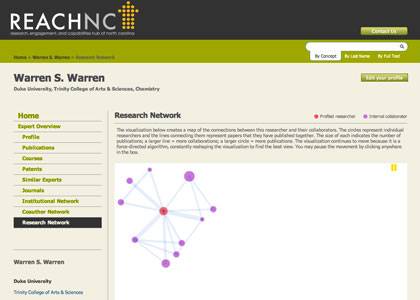
A website that highlights researchers across North Carolina has begun featuring the work of Duke faculty members, opening the door for them to pursue new collaborations with fellow researchers, businesses, nonprofits and others in the state and beyond.
Earlier this month, REACH NC unveiled the profiles of about 2,400 Duke scholars, adding them to its online database of experts within the University of North Carolina system and the Research Triangle Institute. The new profiles include Duke faculty in the Pratt School of Engineering, the Nicholas School of the Environment, the Fuqua School of Business, the School of Nursing and the School of Medicine, as well as selected departments in Arts & Sciences.
The name REACH NC stands for "Research, Engagement and Capabilities Hub of North Carolina." The acronym reflects the project's goal of helping the state "maintain its competitive edge in a global economy" by showcasing research expertise at universities and other local institutions, according to its director, Sharlini Sankaran.
Duke agreed last year to participate in the project, which "will make it easier for Duke faculty to be discovered by potential collaborators, funders, students or others who are looking for someone with particular expertise," said Julia Trimmer, who has guided the effort for Provost Peter Lange. "In the same way, our faculty can use the site to network with others on campus or around the state. We expect the site to also become a resource for administrators who want to pursue funding opportunities, identify speakers or to just gain a better understanding of someone's research."
The system has already attracted the attention of local organizations such as the NC Biotech Center, which has used it to identify experts who can help recruit businesses to the state. An economic developer reported using it recently to find an economic modeling expert familiar with renewable energy technologies.
REACH NC highlights a faculty member's research areas, publications, co-authors, institutional affiliations and other information. The material comes from SciVal Experts Profiles and the Scopus database, pulled from online journals and other academic sources. The system creates keywords such as "cancer" or "finance" that promote appropriate matches. It adds new publications automatically, without any work from the researcher.
It's an approach that works especially well with disciplines that rely on peer-reviewed journal articles, such as the physical and life sciences, but is less effective with other fields. Trimmer said the faculty at several Duke schools -- law, divinity and public policy, along with some Arts & Sciences departments -- are not yet included in the system, which has plans to expand the scope of its scholarly offerings. Next in line to be added to the system are some faculty members from Duke's Sanford School of Public Policy.
Trimmer emphasized the project is a "preliminary step" toward displaying robust profiles for all Duke faculty through a campus-wide project the provost's office is now pursuing. The planned Scholars@Duke hub will provide information about what Duke faculty are doing in their classrooms as well as in their research. It will assemble data now strewn across multiple public and institutional sources, including the existing Duke FDS and FReD faculty databases. Faculty members will be able to harvest the information for their own websites and CVs and use the system for other tasks, such as submitting full-text articles to the Open Access repository at Duke Libraries.
The provost's office is funding the effort with the School of Medicine, working in cooperation with the Office of Information Technology and other campus partners, and guided by a steering committee of faculty members and others.